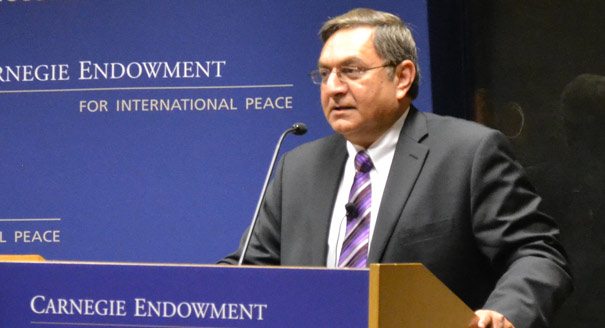Registration
You will receive an email confirming your registration.
IMGXYZ4071IMGZYXThe development of a nuclear bomb in Pakistan constituted a triumph over trying obstacles. In his latest book, Eating Grass: The Making of the Pakistani Bomb (Stanford University Press, 2012), retired Pakistani Brigadier General Feroz Khan presents the first comprehensive history of Pakistan’s nuclear weapons program. Carnegie’s George Perkovich moderated a discussion of the book’s main findings between Khan and Peter Lavoy, principal deputy assistant secretary of defense for Asian and Pacific Security Affairs.
The Development of a Pakistani Nuclear Program
- Program Impetus: Pakistan contemplated the development of the nuclear bomb through the 1950s and 1960s, a period which Khan calls the reluctant phase. Defeat in the 1971 war –leading to the independence of Bangladesh -- triggered the development of the Pakistani nuclear weapons program. According to Khan, the Pakistani decision reflects general patterns apparent in most other nuclear cases.
- Never Again: Many states justify the pursuit of a nuclear weapons program with a resolve to “never again” experience a national moment of humiliation or defeat. Khan pointed to the military defeat of Pakistan in 1971 as the moment that pushed Pakistan toward a nuclear weapons program as an ultimate security guarantee against India.
- National Identity Struggle: Khan noted that nuclear weapons contribute to a cohesive national identity that states desire. Possession of nuclear weapons—a tool of power projection, a symbol of state scientific prowess, and a point of national cohesion—contributes to a nation’s sense of self, he argued.
Challenges in Development
Khan explained the historical challenges to Pakistan’s nuclear program:
- Domestic Politics: Political disputes and sectarian conflict frequently bedeviled the nuclear program. Khan pointed out to the Bengali conflict as an example of how domestic conflict contributed to an exodus of key scientists, technicians, and leaders from Pakistan, which significantly stunted progress on the nuclear program.
- International Politics: The international nonproliferation regime grew teeth precisely during the young years of the Pakistani nuclear program, Khan added. Consequently, Pakistan suffered through international sanctions targeting the Pakistani bomb.
- Technological Setbacks: Technological difficulties also slowed progress. For example, Khan said, Pakistan spent nearly a decade developing nuclear delivery systems.
- Economic, Social, and Political Costs: In addition to the direct economic expense of nuclear weapons, Lavoy remarked on the indirect social and political costs accrued by Pakistan:
- Social Problems: Pakistan relied on loans from Saudi Arabia and Libya to fund its nuclear program. These relationships introduced extremist strands of Islam into Pakistan that now saturate the impoverished country with significant social and political consequences.
- Political Problems: Imbalances in Pakistani civil-military relations is in part a consequence of military control over nuclear weapons and the nature of nuclear policy.
Contemporary Challenges
Khan explained that after Pakistan tested a nuclear explosive device in 1998, the country faced a new set of problems.
- The Experience Gap: Khan noted that after Pakistan came out of the nuclear closet in 1998, no one knew how to convert nuclear weapons into a deterrent force. It was not until the creation of the Strategic Plans Division that a professional organization governed nuclear policy, Lavoy added. Rapid developments after 2008 have again forced Pakistan to engage in another learning exercise as Islamabad’s nuclear doctrine lags behind the technological innovations of tactical nuclear weapons, cruise missiles, and sea-based deterrents.
- Domestic Crisis: Sectarian violence, terrorism, and internal instability plague Pakistan. Khan pointed out that nuclear weapons are only effective when they are supported by other elements of national power, like domestic strength.
- The Original Myth: Lavoy notes that the political and strategic culture surrounding the origin of Pakistan’s nuclear programs lends an indelible character to its trajectory. Lavoy argued the sentiments of intense insecurity and secrecy that characterized the program at its conception inhibit its progress today.
Two Futures for Pakistan
Khan concluded that Pakistan will likely progress along the one of two trajectories:
- The Robust Pakistan: A moderate and pragmatic Pakistan would develop balanced civil-military relations and would view nuclear weapons as purely a national security instrument, building international confidence.
- The Radical Pakistan: Khan warns that if an extreme right-wing government assumes power in Pakistan, the nuclear bomb could become an ideological instrument of power. This future would likely jeopardize Pakistan’s international relationships and threaten the longevity of its nuclear program.
Despite the fact that its entire population exists under the shadow of potential nuclear use, Pakistan lacks a democratic discussion of the costs and benefits of its nuclear program. Lavoy concluded that if Eating Grass: The Making of the Pakistani Bomb triggers a national debate and a thirst for more knowledge about the program in Pakistan, then Khan will have contributed a great deal to international security and the security of Pakistan.
